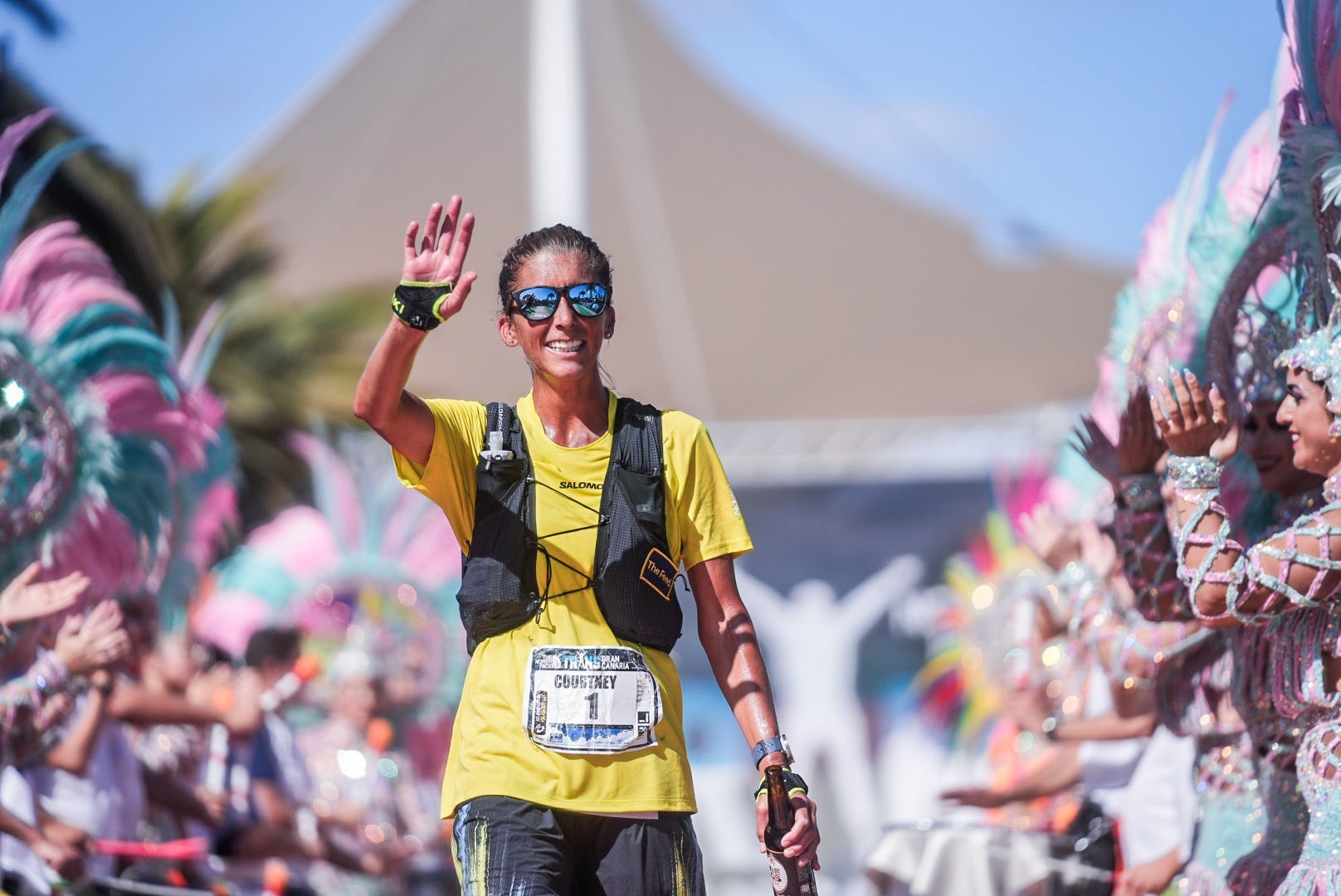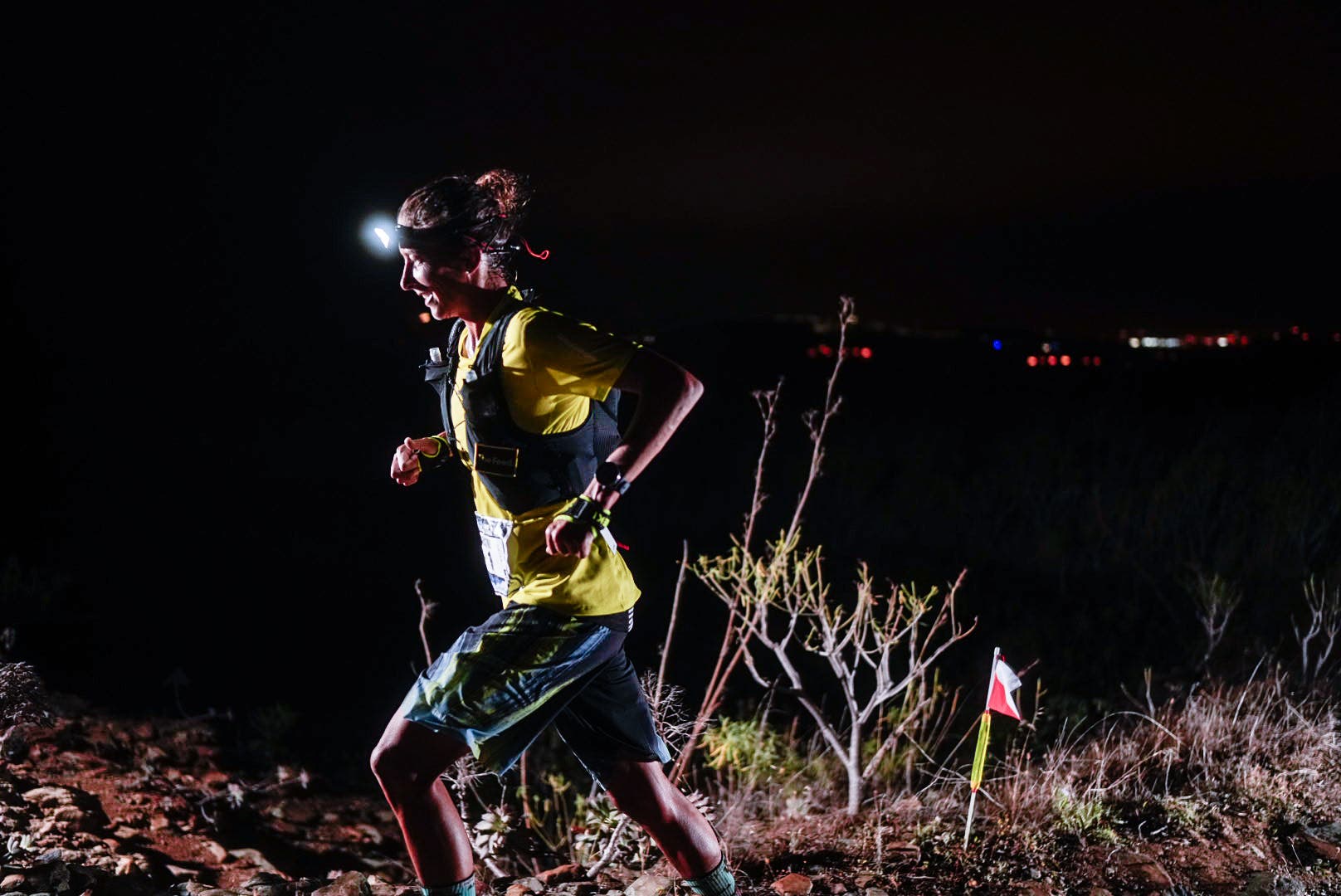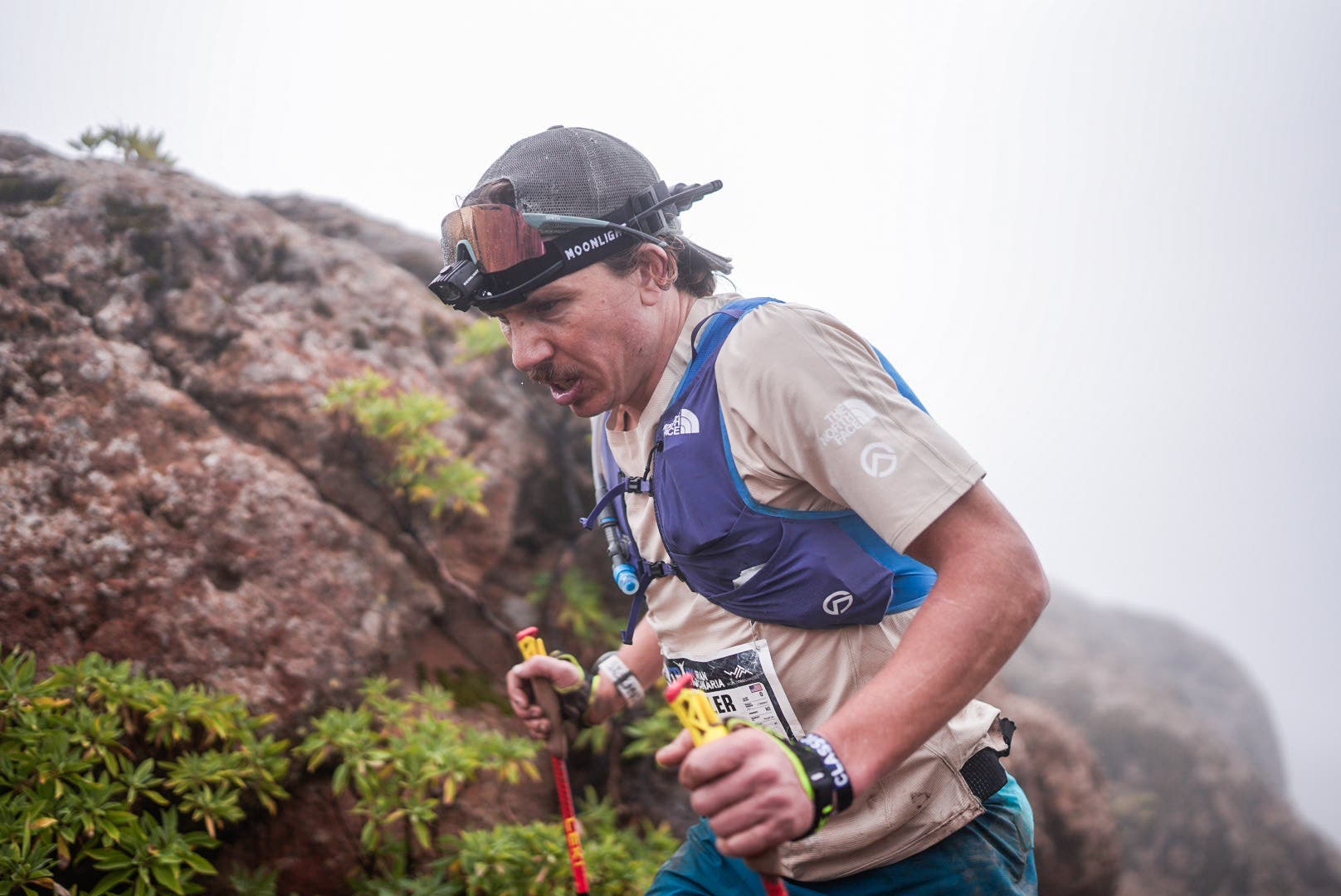Courtney Dauwalter, U.S. Women Triumph at Transgrancanaria

(Photo: The Adventure Bakery )
Good thing Courtney Dauwalter put a serious dent in her pain cave on Saturday—she needed to make room for some new hardware.
Just five months after completing her historic Western States 100, Hardrock 100, and UTMB Mont Blanc triple crown, Dauwalter defended her Transgrancanaria 126K title in a decisive albeit depleting wire-to-wire win.
“This year I feel very grateful I made it to the finish line. It felt 100 times harder out there. I don’t know, it may have been many factors or it’s just how the day was,” Dauwalter said at the finish line after taking a few celebratory sips of beer and high-fiving the throngs of fans lining the finishing chute. “It was very beautiful, I still love these trails. It was just very difficult.”
The GOAT of ultra-trail headlined an American women tour de force at the festival of five events on Gran Canaria, one of the Spanish Canary Islands just off the coast of Morocco. The event’s title sponsor The North Face sent its whole roster, with Americans Katie Schide winning in the VK, Jennifer Lichter the 50K, Tara Fraga the 84K, and Brittany Charboneau taking second in the 21K.
The American men suffered a bit harder against a stout international field at this early season classic, which has offered runners the opportunity to race on punishing, stunningly beautiful trails for 25 years. (More on that below).
Meanwhile 6,000 miles away in Marin County, California, Daybreak Racing, Freetrail, and Mountain Outpost conspired to bring a quality early-season race to the homeland. The outcome was the Big Alta, which attracted some top American talent in its first year—including trail power couple Eli and Tabor Hemming, who won the 50K and 28K, respectively.
Let’s break it all down with our top takeaways from the weekend:
RELATED: How Western States 100 Champion Courtney Dauwalter Keeps Running Simple

1. Courtney Dauwalter Expands Her Pain Cave
Dauwalter cleaned up so handily last year, it’s easy to forget that her 2023 season started with a course-record win at Transgrancanaria, the ultra-trail classic that covers the length of Gran Canaria to the tune of 126K (78.3 miles) and 22,300 of vert. Dauwalter, however, certainly remembered. This year, the 39-year-old Salomon-sponsored runner raced like a defending champion determined to hold onto her title, made even more significant this year thanks to a 36,000 euro (roughly $39,000) prize purse and the distinction of being a World Trail Major.
From the start at the stroke of midnight, Dauwlater charged from the beach and up into the hills as the city lights sparkled below. She immediately gapped the women’s field, putting in nearly two minutes on the next best competitor just an hour into the race. The weather disintegrated into rain, wind, and fog overnight and runners jostled for position behind, but Dauwalter ran unfettered, donning a jacket as needed and marching on up towards the island’s highpoint.
By daybreak, Dauwalter’s body language and determined glint in her eye suggested we were seeing Dauwalter circa 2023 UTMB—grinding through fatigue—rather than the Dauwalter who set the course record here last year.
Ultimately, it didn’t matter. The fog burned off, giving way to a sunny, hot and humid Saturday, and Dauwalter, poles out and earbuds in, stomped up the steep, rocky hills and flew down the descents, characteristically long baggy shorts blowing in the ocean breeze, breaking the tape in 15:14:54—35 minutes slower than last year, but an hour and 13 minutes ahead of second place Claudia Tremps, 27, from Spain. Emma Stuart, a 33-year-old Irish animal veterinarian, took third in 16:50:40.
“I hoped for a nice lonnnng visit to the Pain Cave and that’s exactly what I got,” Dauwalter wrote on Instagram. “Was a really tough night & day crossing the island but I am feeling so thankful for the opportunity to have to dig in and find ways to keep pushing forward. The cave got quite a bit bigger!”
Takeaway: By replicating her 2023 season-opening performance, on paper Dauwalter is poised to remake history once again in 2024. But looking at the full picture, perhaps she’s not fully recovered from her unbelievable 2023 campaign. Dauwalter famously holds her cards close to her chest so don’t expect to hear any answers soon. But one thing is for certain: she traveled to the island with the intention of putting in some serious work in her pain cave, and she returns home to Leadville, Colorado, with a shiny new addition—oh and yeah, another history-making win.

2. American Women Shine at Transgrancanaria
While Dauwalter headlined the main event, the American women on the TNF team nearly swept the other four races. Katie Schide, the 32-year-old runner from Maine who lives in the Maritime Alps of southern France, translated her hybrid winter training of skimo racing and running to a commanding win in the Vertical Kilometer on Wednesday. Schide zipped up the 3.5-mile course with 3,200 feet of climbing in 47:31, over three-minutes ahead of second place Lena Laukner from Germany. Watch out world, Schide—last year’s runner-up to Dauwalter at Western States—is bringing some serious top-end fitness back to Olympic Valley this June.
RELATED: Sophia Laukli is Living Large as a World-Class Athlete, Two-Times Over
Like her teammate, Jennifer Lichter, 27, translated winter training in Missoula, Montana, to success under intense solar radiation. Making good use of her monster aerobic engine on the 6,200-plus feet of climbing and her nimble footwork on the rubbly descents (minus one fall), she led Friday’s 46K (28 miles) wire-to-wire for the win in 4:18:09, nine minutes up on the five Spaniards/locals who followed.
“That was hard,” Lichter said at the finish. “The cheers from the crowd helped a ton.”

Tara Fraga, 31, a fellow TNF runner from Seattle, followed up those commanding victories with one of her own in the 84K (52 miles) on Saturday. She battled through frozen fingers at the top of the island to heat along the exposed second half moving towards the coast to the 15,000 feet of climbing to notch the win in 9:38:37, 25-minutes up on second-place Kathrin Götz from Switzerland. Teammate Brittany Charboneau, 35, of Denver, finished second in the 21K, four minutes behind winner Katarzyna Solińska from Poland, rounding out the near-American sweep.
Takeaway: American women are running with an unfettered fearlessness on the international trail stage. A rising talent pool lifts all runners?
3. And American Men Struggle
American men are returning from Gran Canaria with considerably less hardware. Granted, it’s not at all a fair comparison—only TNF’s Zach Miller, of Bend, Oregon, 35, and Seth Ruhling, 29, of Boulder, Colorado, represented the U.S elites in the highly competitive 126K. Ruhling dropped out at the 50K mark, saying on Instagram that “No one was home in there,” using the brain emoji to signify seemingly that he just wasn’t in the right headspace to compete.
Miller, meanwhile, raced in characteristic Miller fashion in his first crack at this event. He put himself in the race from the starting gun, leading the charge with Spain’s Miguel Heras, 48, for the first four hours as they made their way over several climbs towards Fontales at 42K.

But Miller’s lights-out racing generally goes one of two ways, and on Saturday it went the way one would imagine he prefers less. He seemed to pay for his hot early-race pace, fading to two minutes off the lead at 65K, then six minutes by 77K, and eventually down to seventh place in 14:10:45, 48 minutes behind winner Raul Butaci, 38, of Romania. (He was joined by fellow countrymen Ionel Manole, 35, in third, while Heras hung on for second.)
Takeaway: When it comes to the state of ultra-trail running for American men, we can extrapolate exactly nothing from this race. Miller went for it, and while it wasn’t his day he grinded it out for a very respectable finish among a seasoned and stout field. If anything, what we can learn by comparing the men’s showing to the women’s is that when the U.S. sends a critical mass of runners to compete at these international events, America can hold its own. (And what I really mean by that is, America’s performance at these one-off international events largely depends on the whim of shoe companies who have the means and the motivation to send athletes overseas.)
4. Big Alta Makes a Big Splash
Racing on epic courses in exotic places is neat, but so is celebrating our trails back home with a competitive community race. Enter the Big Alta: a brand new 50K and 28K in Marin County, California.
Pitched as Dylan Bowman of Freetrail’s backyard event, the Big Alta profited from the race production quality of Jeremy Long’s Daybreak Racing and the livestream expertise of Jamil Coury’s Mountain Outpost, showing off Marin’s early-season emerald green splendor for racers and spectators back home alike.
In the men’s 50K especially, it seems like top Coloradans were ready for a winter reprieve. Fresh off a course-record win at the Black Canyon 60K, Eli Hemming, 28, of Kremmling faced the Boulder contingent of Matt Daniels, 35, and Drew Holmen, 31, along with former Coloradan Darren Thomas, 30, currently living in Nevada.
On a bluebird weekend with temps hovering pleasantly in the 50s and 60s, no one could match Hemming on the California carpet style buffed out trails, up grassy knolls affording sweeping views of the valley and San Francisco Bay peeking out from under the fog below, down some insanely steep and sometimes muddy descents. He blitzed the 31.2-mile course with over 7,300 feet of climbing in 3:38:33—17 minutes up on second place Thomas. A late-fading Daniels managed to fend off Holmen for third.
“That first 40K was really fun, but that last hill broke me,” said Hemming. “That was so hard.”
RELATED: Meet the Fastest Trail Running Couple in America
The women’s side showcased some up-and-coming talent, with Lotti Brinks, 27, of Boise, who earned her first Western States Golden Ticket by winning the Grindstone 100K last fall, cruising to the win in 4:42:57. She finished over 20 minutes ahead of second-place Kristina Randrup, 25, of Seattle. Another young gun Sarah Allaben, 24, from Trout Lake, Washington, rounded out the podium just a minute back.
While just over half the distance, the 28K on Sunday proved equally as enthralling. Bay Area locals Nick Handel, 31, and Paddy O’Leary, 36, along with Portland’s Liam Meirow, 28, smashed it from the start for a dynamic three-man showdown. While O’Leary said after the race he was trying to string it out hot, he nearly cooked himself in the process, falling nearly four minutes behind Handel (1:54:48) for second, but fending off Meirow who finished third less than a minute back.
“This is game changing for me. This is going to be a big year,” Handel said at the finish line. “Out here in February feeling like that, it’s going to be fun this year.”
And on the women’s side, Tabor Hemming, 27, ran strong off the front, fending off the late-charging Alaskan Klaire Rhodes, 25, for the win in 2:09:32. They were joined on the podium by Samantha Diaz, 32, from Jackson, Wyoming.
“I was just thinking, ‘Stay smooth and enjoy the day out there.’ It was fun,” Tabor Hemming said. “Hands down, everyone should come to this race.”
Takeaway: Every new race strives to reach that tipping point from who shows up legitimizing the race, to the race legitimizing the athletes who show up. Thanks to instantly classic courses, a vibrant community spirit, and the appeal of a livestream, the Big Alta is well on its way to establishing itself as an early season staple. Selfishly, I’m delighted to see a quality race pop up so close to where the iconic and now deceased TNF 50 once drew top-tier runners as the de facto 50 mile championship every fall.
We’ve seen the rise of livestreams overseas (as well as at Western States) capture the imaginations of Americans over the last decade, leading to this positive feedback loop where increased visibility leads to stiffer competition leads to increased visibility and so on. Just two weeks after the Black Canyon Ultras in Arizona, another Coury livestream special, it seems like we’re on the brink of an American ultra-trail renaissance, where the most attractive races on the ground are also those most attractive to watch at home. Beaming races to the world helps bridge the connection between elites and everyone else, growing the sport at the front, middle, and back of the packs.